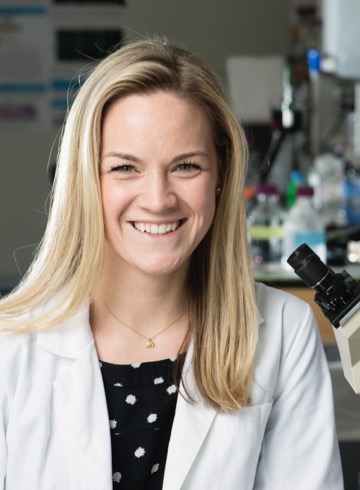Lindsey Avery Fitzsimons
Education
- B.S. Exercise Physiology, Skidmore College
- M.S. Clinical Exercise Physiology, East Stroudsburg University
Biosketch
Lindsey Fitzsimons is a PhD Candidate studying congenital heart disease in the Tucker Laboratory at the University of New England (College of Osteopathic Medicine; Biddeford, ME). Lindsey holds a B.S. in Exercise Physiology from Skidmore College (Saratoga Springs, NY) and an M.S. in Clinical Exercise Physiology from East Stroudsburg University, (East Stroudsburg, PA). After beginning her PhD studies in the field of Biokinesiology at the University of Southern California (Los Angeles, CA), Lindsey transferred to the University of Maine (Graduate School of Biomedical Science) where she is currently a PhD Candidate, and also works as an Instructor of Gross Anatomy and Integrative Histology for first-year medical students at the University of New England, College of Osteopathic Medicine (UNE COM). Lindsey’s research in the Tucker Laboratory aims to improve our understanding of how the physical structure of developing (progenitor) cells may or may not affect the ways in which cells communicate with each other as they build the developing, embryonic heart.
Research Interests
i. Role of primary cilia in pathogenesis of congenital heart defects, specifically ventricular development
ii. Non-compaction cardiomyopathy: Pathogenesis and clinical implications
iii. Estrogen and ErbB: Role in (heart) development and disease; associated mechanisms of chemotherapy-induced cardiotoxicity
iv. Cardiovascular adaptations to high-intensity aerobic interval training/ Cardiovascular adaptations to exercise training in healthy and clinical populations
Lab rotations
1. Regan Lab Rotation (MMCRI):
During my rotation in the Regan Lab, I focused on characterizing the bone marrow microenvironment, with a focus on adipogenic turnover and its applications to the pathogenesis of Multiple Myeloma. This project involved the use of 3-dimensional silk scaffolds and a variety of cell co-culture experiments to model the bone marrow microenvironment in health and disease
2. Tucker Lab Rotation: (UNE/Dissertation Lab):
My rotation in the Tucker Laboratory involved a comprehensive characterization of the congenital heart defects (CHD) resulting from loss of cilia in the embryonic mouse heart. Primary cilia-media CHD is a primary focus of the Tucker Laboratory, and provided the opportunity to work with a variety of different disease models, both in vivo and in vitro, to conditionally eliminate primary cilia during heart development. My current dissertation project was built from this initial rotation work.
3. Townsend Lab Rotation: (University of Maine, Orono):
During my summer rotation in the Townsend Laboratory, I used my experience from the Tucker Lab to characterize primary cilia of a unique cell population called tanycytes, found in the hypothalamus of the brain. This characterization involved a variety of microscopy techniques, including immunohistochemistry, immunofluorescence, and electron microscopy. I also helped design a set of in vivo experiments exploring exercise-induced adaptations in peripheral innervation of adipose tissue, with a focus on central and peripheral circulating endocannabinoids and their receptors. To complement this larger experiment, I designed and implemented a novel histology protocol to characterize and quantifying intra- and inter- muscular adiposity in response to exercise training in mice.
Selected Publications:
Lindsey A Fitzsimons, Adrian M Moran, and Kerry L Tucker. 2018. Primary Cilia of Cardiac Neural Crest Cells Modulate Both Outflow Tract Development and Ventricular Trabeculation. Circulation 138: A12558
Lindsey Avery Fitzsimons, John Forrester, Kevin Budziszewski, Adrian M. Moran, Amy J. Davidoff, and Kerry L. Tucker. 2018. Electrophysiological Consequences of Congenital Heart Defects Shaped by Primary Cilia-Dependent Cardiac Developmental Processes. The FASEB Journal 32: No.1_supplement
Kyuwan Lee, Irene Kang, Joanne E Mortimer, Fred Sattler, Wendy J Mack, Lindsey Avery Fitzsimons, George Salem, Christina M Dieli-Conwright. 2018. Effects of high-intensity interval training on vascular function in breast cancer survivors undergoing anthracycline chemotherapy: design of a pilot study. BMJ Open 8:e022622
Fairfield H, Falank C, Avery L, Reagan MR. 2016. Multiple Myeloma in the Marrow: Pathogenesis, Models and Treatments. Ann N Y Acad Sci. 1364(1):32-51

